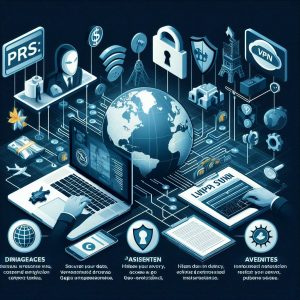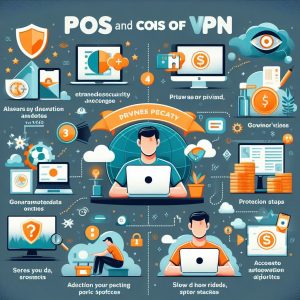Introduction
A Virtual Private Network (VPN) has become an essential tool for many internet users who want to protect their online privacy and security. As VPNs grow in popularity, it’s important to understand both the advantages and disadvantages before deciding if using one is right for you.
A VPN creates an encrypted tunnel between your device and the wider internet, routing your traffic through an intermediary server run by the VPN provider. This masks your IP address so that your online activities can’t be easily traced back to you. VPNs were originally designed to allow remote workers to securely access workplace networks and resources, but are now more commonly used by individuals to keep their browsing private.
When considering getting a VPN, you need to weigh up the pros and cons based on your own internet needs. VPNs can provide important privacy and security benefits, but also have some downsides regarding speed, access to content, and trust in the provider. This article will outline the key advantages and disadvantages so you can make an informed decision about VPN use.

Advantages of Using a VPN
There are many valuable reasons to use a VPN beyond just security and privacy. VPNs can save you money, remove geographical restrictions, and counter censorship and throttling by internet service providers (ISPs).
Secures Your Data
One of the biggest advantages of using a VPN is that it encrypts all the data you send and receive while connected to an encrypted VPN server. This prevents your internet service provider (ISP) and hackers from monitoring your browsing activity or intercepting sensitive information like passwords, emails, instant messages, and credit card details. This makes using public Wi-Fi much safer.
Protects Your Online Privacy
VPNs route your internet traffic through an encrypted tunnel, hiding your IP address and online activities from the websites you visit. This prevents companies, advertisers, and governments from tracking your location and building profiles of your interests and habits for targeted advertising or mass surveillance. VPNs allow you to browse the internet anonymously.
Masks Your IP Address
Your unique IP address can be used to identify your location and device. But when you connect through a VPN server, you share the IP address of that server, masking your real IP address. This prevents websites from gleaning your location or linking any browsing records back to you. Masking your IP address is useful for securing anonymity.
Access Blocked Content
VPNs allow you to virtually relocate your device to another geographic location. This allows you to bypass geographic restrictions and censorship to access news, social media, video streaming, and other sites blocked where you live. VPNs provide an important way to counter internet censorship.
Saves Money on Online Purchases
Retail sites will often adjust pricing based on your location, showing higher prices to those in wealthier regions. Connecting to a VPN server in a lower-income region can reveal cheaper pricing for flights, hotel rooms, electronics, software, and other goods. This unblocking of geographic pricing discrimination can save you money.
Allows Unrestricted Access to the Internet
Some repressive countries and regimes block access to parts of the internet, like certain websites and social media platforms. Using a VPN server located in a different country provides open access to the wider internet, allowing citizens to access uncensored information. VPNs serve as vital tools for promoting free speech.
Removes Bandwidth Throttling
Some ISPs intentionally slow down bandwidth-intensive applications like video streaming through throttling. Connecting through a VPN masks what type of internet traffic you are using, preventing the ISP from throttling speeds for specific sites and services. This results in faster bandwidth speeds.
Protects Personal Information
Public Wi-Fi networks in places like cafes and airports are notoriously easy for hackers to infiltrate. VPN encryption provides a secure tunnel for internet traffic even over public networks, keeping passwords, emails, instant messages, downloads and web history safe from snooping or data capture. VPNs provide important protection for your personal information.
Gets Around Internet Censorship
Many restrictive countries censor access to parts of the internet like Western news outlets and social media. By routing your traffic through another country, VPNs allow you to bypass this censorship to access the open global internet. VPNs are vital for getting the full benefits of the internet.
Hides Your IP Address
Your IP address can be used to gather a lot of information about you, such as location and browsing history. VPN services assign you an IP address from their own pool of addresses, effectively hiding your real IP address and protecting your privacy. This makes it much harder for websites or hackers to track your activity across the internet.

Disadvantages of Using a VPN
While VPN services provide many important benefits, there are also some downsides to weighing up before choosing a provider. These potential disadvantages relate to factors like speed, accessibility, security, and legality.
Slows Down Your Internet Speed
Routing your internet traffic through an intermediary VPN server can lead to slower connection speeds. All the encryption and extra hops between networks degrades performance. So while VPNs might remove throttling from your ISP, the VPN connection itself can slow things down, especially for streaming or large downloads.
Specific Activities May Not Function Well
Latency-sensitive applications like online gaming, video conferencing tools, and live sports streaming can struggle with the slight lag caused by VPN connections. The extra delays introduced across the encrypted tunnel may cause lags, buffering, or connectivity drops for real-time online activities.
May Decrease Internet Speeds
The encrypted tunnel of a VPN does add some extra overhead to your internet requests, diverting your traffic through the service’s distant servers. This introduces latency and can naturally degrade your connection speeds. So websites and downloads may respond a little slower when accessing the internet via a VPN.
Possibly Blocks Some Content
Some sites actively block traffic from known VPN servers to try to enforce geographic restrictions. So when connected to a VPN you may find you have trouble accessing some streaming, social, gaming or shopping sites that worked fine without the VPN enabled. VPNs can in some cases block access.
Potentially Jeopardizes Your Security
While trustworthy VPN providers do not monitor or log your activity, some disreputable providers could exploit having all your internet traffic passing through their servers. They could be capturing private data, inserting tracking cookies, or selling browsing records. You have to trust the ethics and security standards of your VPN provider.
Illegal in Some Countries
While VPNs serve a vital role in bypassing censorship and restrictions, some regimes have made the use of VPNs illegal within their borders as they undermine government control. Getting caught signing up for or using a consumer VPN in countries like Russia, Turkey, and Iraq could mean fines or even jail time in extreme cases.

Conclusion
Deciding whether to use a VPN involves weighing up the benefits you need against any potential speed, access, trust or legal downsides. VPN services can provide vital security and privacy protection online by encrypting traffic and masking IP addresses. But performance might drop, some sites may block access, and you have to research providers to find ethical policies.
For many internet users, having enhanced online privacy, reduced tracking, secure public Wi-Fi access, and the ability to bypass internet censorship will be compelling reasons to get a VPN. But for activities like real-time gaming or streaming sports, the extra delays could frustrate. Getting clear on your needs and researching providers is essential to find the right VPN solution for you, or determine if risks outweigh the benefits. With the right provider and setup, VPN services can safely enhance security and access.